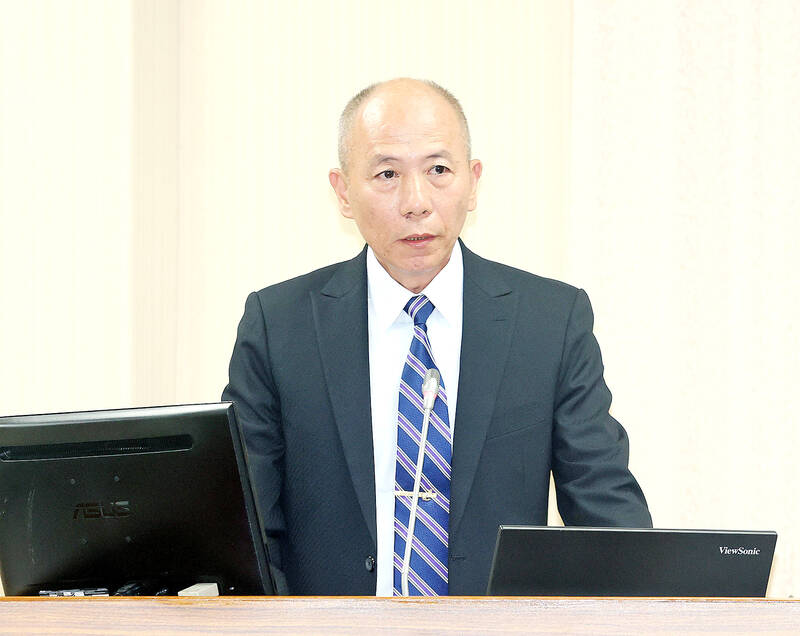The annual Han Kuang military exercises this year would be unscripted and not feature live-fire drills on Taiwan proper in a departure from previous iterations, Chief of the General Staff Admiral Mei Chia-shu (梅家樹) told lawmakers yesterday.
Mei made the remarks in a question-and-answer session on the exercises at a meeting of the legislature’s Foreign Affairs and National Defense Committee in Taipei, the first time a chief of the general staff had reported to lawmakers in nearly 25 years.
This year’s Han Kuang exercises are scheduled for July 22 to 26.

Photo: CNA
The design of this year’s military drills has undergone extensive changes focusing on familiarizing maneuver brigades with their operational environment and roles in war plans to address the rising threat from China, he said.
The exercises would emphasize realism and practicing decentralized command and control, and would not have scripts and rehearsals or the participation of marines and army special forces role-playing as opposition forces, he said.
That means the annual Lien Hsin marine corps amphibious assault drills and annual army special forces parachute drills would be held separately from Han Kuang exercises in another change from past practice, Mei said.
The former would be conducted early next month, while the latter would be held sometime after the Han Kuang exercises, he said.
Marines and special forces would instead focus on their assigned missions, operational environment, and command and control arrangements, he added.
When asked to clarify the partial omission of live-fire drills, Mei said troops based in the nation’s outlying islands would practice with live ammunition as before.
Military units based in Taiwan proper would conduct live-fire exercises separately, he said, adding that this year’s guided precision munition drills have increased in rigor.
Giving commanders freedom of action, clear areas of responsibility and rules of engagement, and ensuring units are capable of operating without being given orders are part of the distributed command and control capabilities that this year’s exercises would put to the test, he said.
Echoing Mei’s comments, Minister of National Defense Wellington Koo (顧立雄) told legislators that the canceled part of the live-fire drills was performative and that units have been allotted more live-ammo practice than in previous years.
Separately, Mei told reporters on the sidelines of the legislative meeting that he does not consider attending the committee meeting in person to be demeaning to the chief of the general staff’s office.
Should his appearance at the meeting instill a greater understanding for and appreciation of the armed forces in the public and media, going to the legislature would be worthwhile, he said.
Koo at the same impromptu news conference said that the admiral attended the session out of respect for lawmakers and that Ministry of National Defense officials believe the nation’s top commander in principle should answer their summons.
However, legislators should limit their questions to the annual military drills and not expect to summon the chief of the general staff as a matter of course, Koo said.

Taiwan is stepping up plans to create self-sufficient supply chains for combat drones and increase foreign orders from the US to counter China’s numerical superiority, a defense official said on Saturday. Commenting on condition of anonymity, the official said the nation’s armed forces are in agreement with US Admiral Samuel Paparo’s assessment that Taiwan’s military must be prepared to turn the nation’s waters into a “hellscape” for the Chinese People’s Liberation Army (PLA). Paparo, the commander of the US Indo-Pacific Command, reiterated the concept during a Congressional hearing in Washington on Wednesday. He first coined the term in a security conference last

Prosecutors today declined to say who was questioned regarding alleged forgery on petitions to recall Democratic Progressive Party (DPP) legislators, after Chinese-language media earlier reported that members of the Chinese Nationalist Party (KMT) Youth League were brought in for questioning. The Ministry of Justice Investigation Bureau confirmed that two people had been questioned, but did not disclose any further information about the ongoing investigation. KMT Youth League members Lee Hsiao-liang (李孝亮) and Liu Szu-yin (劉思吟) — who are leading the effort to recall DPP caucus chief executive Rosalia Wu (吳思瑤) and Legislator Wu Pei-yi (吳沛憶) — both posted on Facebook saying: “I

The Ministry of Economic Affairs has fined Taobao NT$1.2 million (US$36,912) for advertisements that exceed its approved business scope, requiring the Chinese e-commerce platform to make corrections in the first half of this year or its license may be revoked. Lawmakers have called for stricter enforcement of Chinese e-commerce platforms and measures to prevent China from laundering its goods through Taiwan in response to US President Donald Trump’s heavy tariffs on China. The Legislative Yuan’s Finance Committee met today to discuss policies to prevent China from dumping goods in Taiwan, inviting government agencies to report. Democratic Progressive Party Legislator Kuo Kuo-wen (郭國文) said

Sung Chien-liang (宋建樑), who led efforts to recall Democratic Progressive Party (DPP) Legislator Lee Kun-cheng (李坤城), was released on bail of NT$80,000 today amid outcry over his decision to wear a Nazi armband to questioning the night before. Sung arrived at the New Taipei District Prosecutors’ Office for questioning in a recall petition forgery case last night wearing a red armband bearing a swastika, carrying a copy of Adolf Hitler’s Mein Kampf and giving a Nazi salute. Sung left the building at 1:15am without the armband and covering the book with his coat. Lee said today that this is a serious